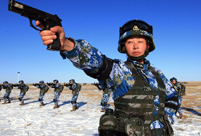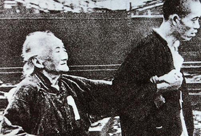 Martenitsa adds glamour to Bulgarian Embassy
Martenitsa adds glamour to Bulgarian Embassy
 Mysterious 'Dolan Tribe' in Xinjiang
Mysterious 'Dolan Tribe' in Xinjiang
 This is Shanghai
This is Shanghai
 Female attendants serving 'two sessions'
Female attendants serving 'two sessions'
 The many tears of DiCaprio
The many tears of DiCaprio
 Dan Dan's bittersweet opera life
Dan Dan's bittersweet opera life
 A dream wedding for a girl suffering from cancer
A dream wedding for a girl suffering from cancer
 Old photos of Anti-Japanese War (1937-1945)
Old photos of Anti-Japanese War (1937-1945)
 This is Beijing – Nanluoguxiang
This is Beijing – Nanluoguxiang
DIALOGUE 2
Xinhua: How does China's educational model differ from that in your country? What can China learn from the experience of your country in education? What should China do to meet international standard?
Annastasia Troshina, a mandarin teacher at School 1583 in Moscow said Chinese teachers too strictly stick to teaching plan to allow proper flexibilities in classes.
Such an approach tends to ignore personalities of students and their interests, Troshina added.
In Russia, teachers can encouraged to make their own teaching plan taking into students' interests and talents, Troshina said.
"I think education programs should strike a balance between curriculum planning and students' interests and talents," the teacher suggested.
Stephane Phetsinorath, who works for BioMerieux, a French company, said China should forge its own educational system, avoiding duplicating that of the West.
"With more frequent academic exchanges and more teachers coming to China from different places around the world, Chinese universities are becoming increasingly open to the outside world," said the employee who graduated from Shanghai Jiaotong University.
Phetsinorath also said his experience told him that Chinese students should improve their creativity and proactivity to better adapt themselves to the labor market.
DIALOGUE 3
Xinhua: At the ongoing "two sessions," China's education reforms focused on such topics as how to promote education fairness, balance distribution of educational resources, and transform the admission exam system. What impact do you think such policies will have on China's development?
Nazia Vasi, president of the Inchin Closer School, a school that teaches Chinese in India, said the two sessions will have a huge influence on China's educational reforms.
"It is widely known that China has been a manufacturing center of the world and its educational reforms can help cultivate more top-level talents for manufacturing industry and service and financial sectors," Vasi said.
Richard Trappl, dean of the Confucius Institute at the University of Vienna, said China's recent developments have, to a large extent, benefited from its commitment to education.
"With the advance of its urbanization process, China should pay more attention to education in its rural and remote areas. If talented and competent people are deprived of their opportunities due to poverty, it would be a tragedy," the dean said.
"China should guarantee equal educational opportunity to all children to produce more talents with social responsibility and global vision," Trappl added.

 Chaihe village, pure and peaceful fairyland in snow
Chaihe village, pure and peaceful fairyland in snow Belgians warmly welcome arrival of China's giant pandas
Belgians warmly welcome arrival of China's giant pandas Female marines receive tactical training in NW China
Female marines receive tactical training in NW China Blood memory: Nanjing Massacre in 1937
Blood memory: Nanjing Massacre in 1937 Top 10 pure beauties in showbiz
Top 10 pure beauties in showbiz British WWII veteran: I can't forgive Japan
British WWII veteran: I can't forgive Japan Tongban's dream of prosperity
Tongban's dream of prosperity Chinese frigate Yancheng holds drills in Mediterranean Sea
Chinese frigate Yancheng holds drills in Mediterranean Sea A visit to comfort woman's home in South Korea
A visit to comfort woman's home in South Korea Fairyland? Qingdao in sea of clouds
Fairyland? Qingdao in sea of clouds Top 10 most handsome faces in Asia in 2013
Top 10 most handsome faces in Asia in 2013 Female celebs with beautiful long legs
Female celebs with beautiful long legs Cat 'guardians' in Forbidden City
Cat 'guardians' in Forbidden City Large numbers of ancient coins excavated in Inner Mongolia
Large numbers of ancient coins excavated in Inner Mongolia Leisurely life beneath Zhonggulou, where time travels slower
Leisurely life beneath Zhonggulou, where time travels slowerDay|Week|Month